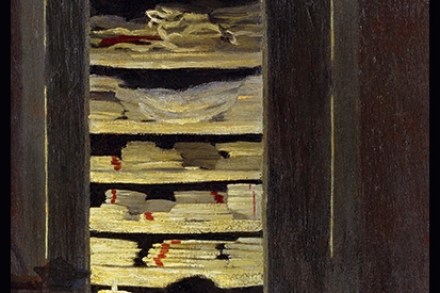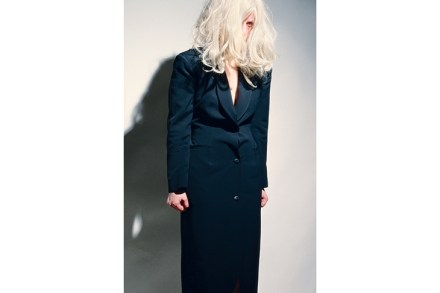Books and Arts – 4 July 2019

The good, bad and ugly in arts and exhbitions
Present Laughter introduces us to a chic, louche and highly successful theatrical globetrotter, Garry Essendine, whose riotous social life is centred on his swish London apartment. This is Noël Coward’s version of Noël Coward. In the script, from 1942, Coward alleges that his alter ego is being chased by three women. The in crowd would have laughed at the reference to Coward’s secret orientation but this version rather earnestly converts one of the females into a rugged Spanish male. What for? Few scripts from the wartime era remain in the theatrical canon and one of the pleasures of seeing a vintage play is to examine the habits and conventions of


Midsommar is the latest horror film from Ari Aster, who made Hereditary, which starred Toni Collette and was a sensation. That was a domestic, claustrophobic scenario packed with jump scares — well, jump-ish scares; I wasn’t that scared, actually — whereas this is pastoral and relies more on building a quiet dread. It’s set in the remote countryside where a pagan community has its own superstitions and rituals and ‘elders’ and a maypole — and they are never good news, maypoles. This is clever and gripping in its own right, but it is also familiar and will certainly put you in mind of The Wicker Man. That is, the 1973

There’s been a Dimbleby on air since before I was born but last Friday saw the end of that era when Jonathan retired as chairman of Radio 4’s Any Questions after 32 years. It’s a bit like imagining life in Britain once the Queen dies. The Dimbleby family has been intertwined with the history of the BBC, and major national events, since the second world war when Richard, the father, carved out his career as a war reporter, most famously from Belsen in 1945. Mere mention of the name conjures up those Reithian values — clear reportage, an intelligent and fair-minded assessment of what’s going on, and access to that

My plan to cut the BBC out of my life entirely is working well. Apart from the occasional forgivable lapse — that excellent Margaret Thatcher documentary; Pointless and Only Connect because they’re the only programmes we can all watch together as a family — I find that not watching or listening to anything the BBC does is making me calmer, happier and better informed. I’m also learning stuff about myself that I never imagined possible. Like the fact that I have a massive man crush on the rap star Kanye West. Though I’ve long been a fan of his albums, I went right off him as a person a few
The selfie is, of course, a major, and to me mysterious, phenomenon of our age. The sheer indefatigability of selfie-takers, not to mention their number, is amazing. Recently, I stayed in an apartment not far from the Trevi Fountain in Rome — a selfie-magnet so powerful that not only was it surrounded by a dense crowd during daylight hours, but a small, determined knot could still be spotted late at night, doggedly snapping away in the dark under a steady drizzle. This global fixation adds an extra interest to the retrospective of work by Cindy Sherman at the National Portrait Gallery. She has been making pictures of herself, and little


It can’t be easy to find yourself on the other end of the microphone when you’re a journalist of the calibre of Emily Maitlis. You know all the pitfalls, how easy it is to be teased out of your bunker, to say more than you ever intended under the scrutiny of an ambitious, driven interviewer with a keen nose for a story. In One to One on Radio 4, though, it was surprising to hear the ultra-cool Newsnight presenter almost in tears as she recalled covering the Manchester Arena bomb and the Grenfell fire. We could hear her voice catching, the tears welling up, her words stuttering as she tried

ITV’s new drama Beecham House is set in late 18th-century India where the British and French were still battling it out for supremacy. Its opening credits feature the east at its most exotic, with a montage of ceremonial elephants parading, sari-clad women gliding and lotus flowers opening. The hero is John Beecham (Tom Bateman), a hunky Englishman who proves honourable to the point of mild priggishness as he navigates his way through a world of dusky beauties, inscrutable orientals and treacherous Frenchies. If there were any Indians around at the time who weren’t gorgeously attired rich people, violent bandits or servants who took real pride in their work, we’ve yet

Bitter Wheat, David Mamet’s latest play, features a loathsome Hollywood hotshot, Barney Fein, who offers to turn an actress into a superstar provided she lets him rape her. The show’s gruesome storyline has flashes of bitter comedy. Fein boasts that the Writers Guild of America would ‘drink a beaker of my mucus’ if he forced them to. Although this is the ultimate #MeToo play it can’t prevent itself from taking a masculine point of view. Fein’s assistant, Sondra (Doon Mackichan), conveniently vanishes at the right moment and leaves the starlet at the monster’s mercy. But was Sondra complicit? We aren’t told. And we learn nothing about her attitude to her

We’ve cried wolf with Handel. Ever since the modern trend began for staging the composer’s oratorios we’ve hailed each one in turn as the composer’s ‘most dramatic’. We’ve said it of Theodora, Saul, perhaps loudest (and most persuasively) of Jephtha. The trouble is that now, nearly 40 years since we last saw Belshazzar on an English stage, this magnificent drama of warring armies and nations, grieving parents and defiant children returns and we’ve spent all our superlatives. So you’ll just have to trust me when I say that it’s really quite good. A narcissistic sybarite of a king rules over a land bloated with corruption, rife with factions. You’d have

Yesterday is the latest comedy (with sad bits) from Richard Curtis, directed by Danny Boyle, about an unsuccessful singer-songwriter, Jack, who wakes up to discover that he’s the only one who remembers the Beatles so can now steal all their tunes, if he’s of that mind. Unusually for Curtis, the lead is an Asian and there is no Bill Nighy (not a sign, not a whiff), which is an advance. And there are some funny moments — when Jack first plays ‘Yesterday’ to some friends, one sniffs: ‘It’s not exactly Coldplay, is it?’ But. It’s all intertwined with a romance that is not just generic but also intolerable. Strangely, I’ve
It’s to be expected. You take photographs in order to document things — Paris in the case of Eugène Atget in the late 19th and early 20th centuries, the shacks of the American south in the case of Walker Evans in the 1930s — and these documents then acquire a quality of elegy. What is extraordinary is the speed with which this happens, the brevity of the ‘then’. As soon as the images emerge in the developing tray — even, conceivably, the moment the shutter is clicked — they are imbued with how they will be seen in the future. The photographs in Fred Sigman’s book Motel Vegas were commissioned

In 1965 a journalist asked Paula Rego why she painted. ‘To give a face to fear,’ she replied (those were the days of the Salazar dictatorship in Portugal). But when asked the same question shortly afterwards, Rego added a qualification: ‘There’s more to it than that: I paint because I can’t stop painting.’ Rego has carried on making pictures ever since and the results can be seen in a remarkable exhibition, Obedience and Defiance, curated by Catherine Lampert at the MK Gallery, Milton Keynes. This is not quite a career retrospective — Rego will get one of those at Tate Britain in 2021. But it is the first time that


The tears of a clown have often fallen on fertile operatic ground. Think of Rigoletto and I Pagliacci; or The Yeomen of the Guard, where mock-Tudor merriment turns to ash in the mouth of the jester Jack Point. But what if the composer himself is the buffoon? Jacques Offenbach was the court jester of France’s Second Empire, and if he’s still (inaccurately) regarded as an essentially frivolous talent, well, let’s be blunt: his 100-plus stage works do include sentient vegetables, scenes of mass flatulence and at least one opera in which the title role is taken by a performing dog. Sympathy was in limited supply when, after the Franco-Prussian war,

Six hundred and thirty years ago, Chaucer revealed in ‘The Wife of Bath’s Tale’ that what women really want is to be totally in charge of everything. With Girl now back home permanently having done her A levels, I can confirm that this is true: no longer am I in control of what we watch on TV, not even when I plead that it’s my job and how else am I going to be able to afford the extensive tour of Magaluf and Bali etc. that she’s got planned this summer? But I don’t mind really because it means I’m forced to watch stuff there’s no way I would have

Kill Climate Deniers is a provocative satire by Australian theatre-activist David Finnigan. The title sounds misanthropic and faintly deranged but the show is a comedy delivered with oodles of verve and fun. Finnigan is a skilful writer of dialogue, a gifted farceur and, at times, an astute analyst of power and its corrupting tendencies. Like most Aussies, he’s incapable of pomposity and his show takes a pop at every player in this game: the politicians, the shock jocks, the sainted Greens and the media. A TV journalist has the surname ‘Ile’ — an anagram of ‘lie’. Finnigan reminds us that the bulk of eco-warriors are white middle-class malcontents whose priority

Walking into Fingal’s Cave, after scrambling across the rocks to reach it from the landing stage where the boat from Mull arrives, is a strangely emotional experience. It’s not just the extraordinary landscape, the precise, almost unnatural shaping of the hexagonal basalt columns that rise up high above you, the screeching of gulls and roaring of the sea as it enters and leaves the cave. That’s enough to provoke a sense of wonder. But there’s also so much history attached to the place since it was discovered by the Romantics and became the epitome of the sentimental landscape, awesome in scale, and also quite frightening. Mendelssohn, Walter Scott and Turner

Nearly 25 years on from its immaculate birth, Toy Story — like Wagner’s Ring, like John Updike’s Rabbit novels — has become a tetralogy. Do we need another one? Isn’t it time for Woody the toy cowboy to stuff that hat on a peg and stop hanging around kids? The short answer is no. Though it springs fewer surprises, Toy Story 4 is still reliably fab. The animation now has such a painterly exactness it may as well be real rain/stubble/tarmac up there on screen. As for the cartoon characters, they project their own truth too, even the newest toy fashioned from a plastic fork-cum-spoon. ‘I can’t believe I’m talking
Margot Fonteyn: A Celebration Royal Opera House The Firebird / A Month in the Country / Symphony in C Royal Opera House The trouble with taking my mother to the ballet is that on the way home she will always say: ‘Well, that was wonderful, darling.’ A thoughtful pause. ‘But of course I saw Nureyev and Fonteyn dance the parts and nothing will ever be the same.’ And so on the Central Line after the Royal Ballet’s Margot Fonteyn: A Celebration, I waited for the sorrowful ‘But…’ It never came. ‘That was wonderful,’ she said. And it was. Dame Margot Fonteyn DBE, prima ballerina assoluta, the company’s patron saint en
